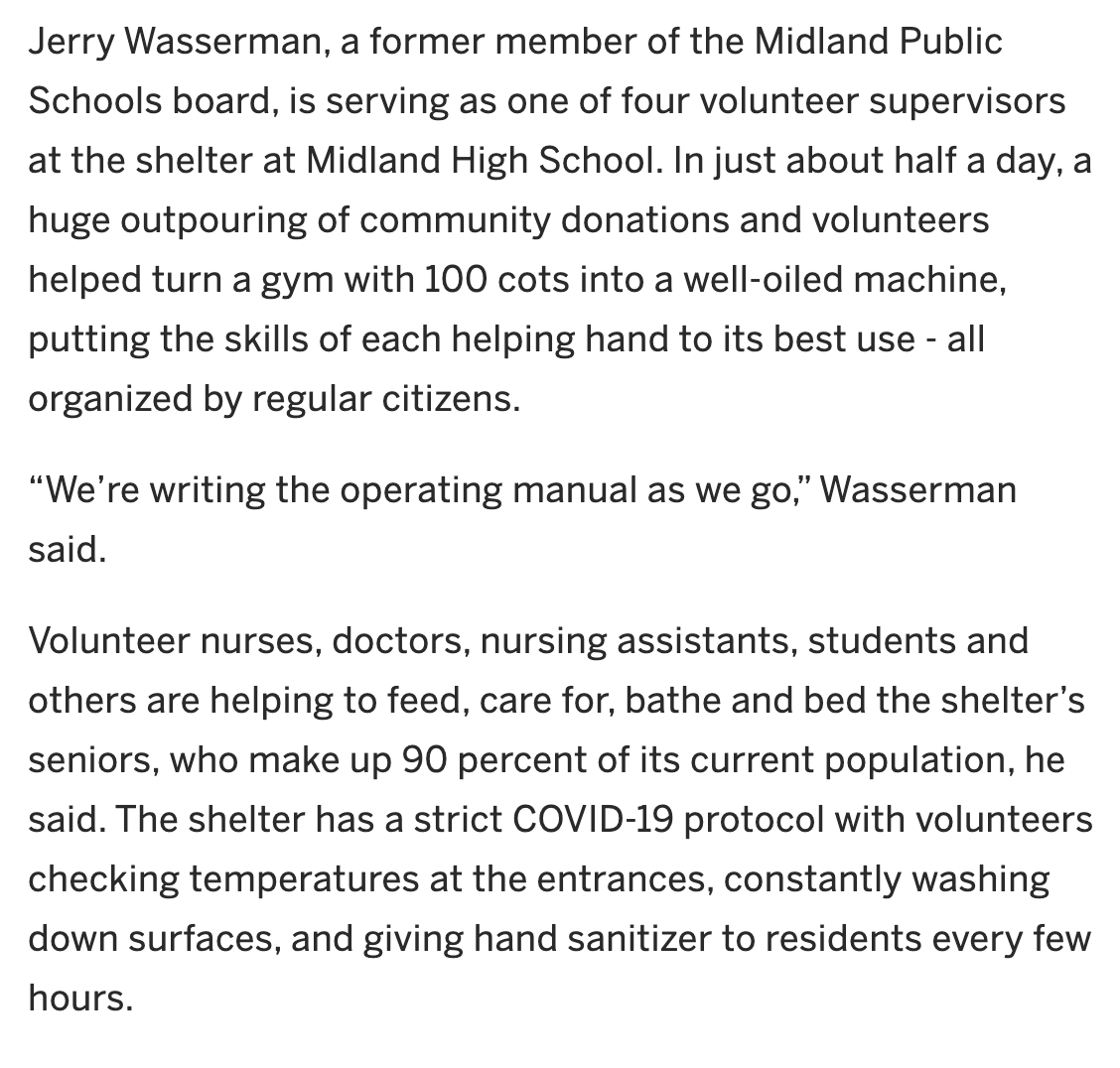The flooding in Michigan required the largest response mobilization (by a number of measures) since the pandemic began so I think it& #39;s worth looking at how the informal system (specifically nonprofits and volunteers) have altered their responses given the new context.
I& #39;ve been questioning how nonprofits, volunteers, grassroots efforts to respond safely to a large-scale disaster (think Harvey sized) but even these "smaller" disasters become more complicated because of the pandemic. https://twitter.com/SamLMontano/status/1259434838542749696">https://twitter.com/SamLMonta...
Even before Michigan there were indications that we were in trouble:
https://twitter.com/SamLMontano/status/1259060889212387328
(Of">https://twitter.com/SamLMonta... course, this is in addition to the paused recoveries) https://twitter.com/SamLMontano/status/1259429176479809537">https://twitter.com/SamLMonta...
https://twitter.com/SamLMontano/status/1259060889212387328
(Of">https://twitter.com/SamLMonta... course, this is in addition to the paused recoveries) https://twitter.com/SamLMontano/status/1259429176479809537">https://twitter.com/SamLMonta...
Last week @cflav did the first deep dive on this & as anticipated:
"Typically more than five million volunteers work in disaster relief annually, said Greg Forrester, president of NVOAD... but this year he expects the number to decline by 50 percent. https://www.nytimes.com/2020/05/22/climate/fema-volunteer-disaster-response.html?action=click&module=Spotlight&pgtype=Homepage">https://www.nytimes.com/2020/05/2...
"Typically more than five million volunteers work in disaster relief annually, said Greg Forrester, president of NVOAD... but this year he expects the number to decline by 50 percent. https://www.nytimes.com/2020/05/22/climate/fema-volunteer-disaster-response.html?action=click&module=Spotlight&pgtype=Homepage">https://www.nytimes.com/2020/05/2...
That is a heart-stopping quote.
I lose my breath a little every time I think of it.
You need to understand that volunteers do EVERYTHING during the response & recovery. Our system is literally set up with the assumption that there will be a "mass assault" of volunteers.
I lose my breath a little every time I think of it.
You need to understand that volunteers do EVERYTHING during the response & recovery. Our system is literally set up with the assumption that there will be a "mass assault" of volunteers.
So, what& #39;s been happening in Michigan the past few days.
Well, first, people did volunteer during the response (this is expected). https://www.wnem.com/news/volunteers-assist-in-shelters-for-displaced-midland-county-residents/article_1a381b2c-9ada-11ea-a022-875800925d5b.html">https://www.wnem.com/news/volu...
Well, first, people did volunteer during the response (this is expected). https://www.wnem.com/news/volunteers-assist-in-shelters-for-displaced-midland-county-residents/article_1a381b2c-9ada-11ea-a022-875800925d5b.html">https://www.wnem.com/news/volu...
Here& #39;s some more details about the volunteer run shelters: https://www.mlive.com/news/saginaw-bay-city/2020/05/midland-community-pulls-together-as-floodwaters-recede-recovery-begins.html">https://www.mlive.com/news/sagi...
Midland County as essentially a virtual volunteer reception center (this has been an ongoing trend in EM for several years) to help coordinate volunteers and donations. https://www.abc12.com/content/news/See-how-you-can-give-to-Midland-flood-relief-get-information-on-investigation-570643401.html">https://www.abc12.com/content/n...
United Way seems to be the organization coordinating the majority of volunteer efforts. (I& #39;d bet my entire life there are many other significant volunteer efforts being coordinated outside of these official structures that haven& #39;t gotten news coverage. https://www.wnem.com/news/flood-relief-volunteering-donations-being-coordinated-through-united-way/article_ac5f805c-9ad6-11ea-9636-bb11ecb58d4b.html">https://www.wnem.com/news/floo...
Other local nonprofits are also obviously involved. Here& #39;s an example related to pet shelters. https://www.mlive.com/news/saginaw-bay-city/2020/05/humane-society-of-midland-county-on-mission-to-keep-pets-safe-during-flooding.html">https://www.mlive.com/news/sagi...
There are individual efforts too. https://www.clickondetroit.com/news/local/2020/05/25/livonia-teen-raises-money-for-victims-of-midland-floods/">https://www.clickondetroit.com/news/loca...
And help from large foundations like the Dow Foundation ( https://abs.twimg.com/emoji/v2/... draggable="false" alt="👀" title="Eyes" aria-label="Emoji: Eyes">) https://www.ourmidland.com/news/article/1-million-awarded-to-United-Way-of-Midland-15287713.php">https://www.ourmidland.com/news/arti...
https://abs.twimg.com/emoji/v2/... draggable="false" alt="👀" title="Eyes" aria-label="Emoji: Eyes">) https://www.ourmidland.com/news/article/1-million-awarded-to-United-Way-of-Midland-15287713.php">https://www.ourmidland.com/news/arti...
Businesses, especially restaurants, are also helping out. https://www.detroitnews.com/story/life/2020/05/22/feeding-midland-county-effort-help-residents-and-first-responders/5244163002/">https://www.detroitnews.com/story/lif...
These are all usual things - people are volunteering, businesses, foundations, disaster nonprofits, local nonprofits, and individual fundraising efforts all happen after disasters.
But yet... this isn& #39;t quite right.
But yet... this isn& #39;t quite right.
It& #39;s not so much what& #39;s being done but the scale of those efforts.
For an event like this that garnered national media coverage there should have been a flood of volunteers. That doesn& #39;t seem to have happened. This isn& #39;t necessarily a bad thing for the *response*.
For an event like this that garnered national media coverage there should have been a flood of volunteers. That doesn& #39;t seem to have happened. This isn& #39;t necessarily a bad thing for the *response*.
It& #39;s often the case that there are too many volunteers in the response and the coordination becomes particularly challenging. In this case, they may have had just the right number of volunteers (this is the vibe I get from media reports).
I think the bigger problem is recovery. Without that mass influx of short-term recovery volunteers recovery efforts can stall.
(I wrote my dissertation on this: https://search.proquest.com/openview/548e81f0f7546fd6ee380861ea63a872/1?pq-origsite=gscholar&cbl=18750&diss=y)https://search.proquest.com/openview/... href=" https://twitter.com/SamLMontano/status/905813530946961409">https://twitter.com/SamLMonta...
(I wrote my dissertation on this: https://search.proquest.com/openview/548e81f0f7546fd6ee380861ea63a872/1?pq-origsite=gscholar&cbl=18750&diss=y)
This has been a problem in recent years as volunteer fatigue has spread across the country (see my dissertation) and the pandemic is (I think) making this worse.
We& #39;re going to need some research here and I hope someone does it. (I& #39;m already loaded down with other research projects and won& #39;t be able to look at Michigan specifically).
Although -- an added challenge of the pandemic is no in-person quick response disaster research!
Although -- an added challenge of the pandemic is no in-person quick response disaster research!
(To study response volunteerism well you have to be there during the response (again, see my dissertation). You can rely on surveys or interviews after the fact because MANY volunteers never sign-in and you can& #39;t find them again.)
This is all to say that we can probably expect what happened in Midland in other communities that have disasters during the pandemic but this is all super complicated (especially as the disasters get bigger).
Nonprofits, volunteers, grassroots efforts are vital & we need them.
Nonprofits, volunteers, grassroots efforts are vital & we need them.
(Yet another thread that should have been an article  https://abs.twimg.com/emoji/v2/... draggable="false" alt="🤷♀️" title="Woman shrugging" aria-label="Emoji: Woman shrugging">. I can& #39;t help that this is who I am.)
https://abs.twimg.com/emoji/v2/... draggable="false" alt="🤷♀️" title="Woman shrugging" aria-label="Emoji: Woman shrugging">. I can& #39;t help that this is who I am.)

 Read on Twitter
Read on Twitter


